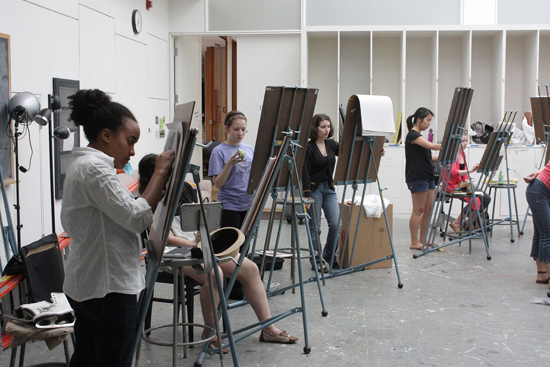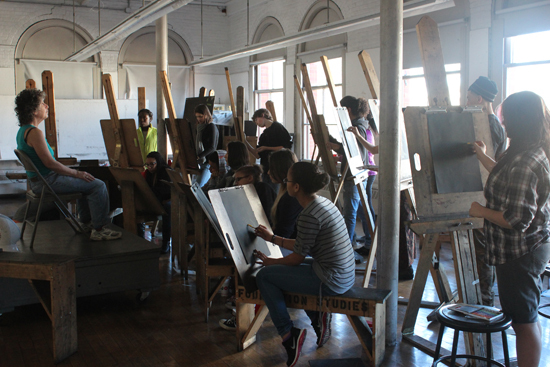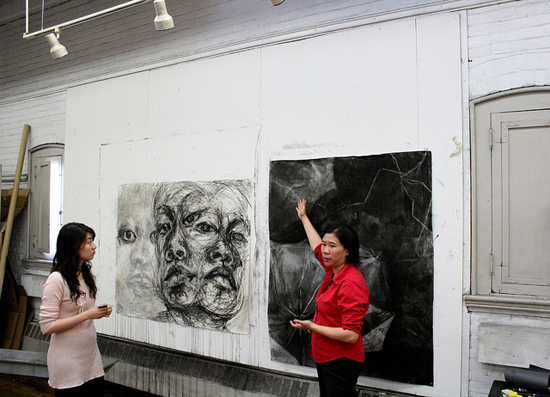When I was a student at art school, I was so involved with making my work day to day that I wasn't able to see the big picture and figure out how to get the most out of my experience. Now that I've been on both sides of the fence as a student and professor, I'd like to offer seven practical tips to students in art school.
1. Work on your homework with other students.
One of the greatest assets of being in school is being surrounded by like minded peers. Many students make the mistake of working on their homework by themselves in their dorm room. If you work alone for a long period of time, it's easy to start to feel crazy without any human contact. Instead, take your art materials and make a plan to meet your classmates in the studio to work on your homework together. With the companionship of your peers, you'll be able to motivate each other to stay focused, and you can ask for feedback and support as you work on your homework.
2. Choose your classes based on the professor.
Many students will frequently choose their elective courses based on the subject, thinking that if they like the subject, they are guaranteed to have a good experience in the class. Know that an excellent teacher can make even the most mundane subject truly fascinating, and that a poor teacher can make even your favorite subject tedious and boring. As a freshman, I was required to take a three-dimensional design course, which I was not enthusiastic about at the time. The professor I had was brilliant, and eight years later I found myself doing a master's degree in sculpture.
3. Form lasting relationships.
The people are what really make a school. A school might have dazzling facilities and equipment, but none of that will make a difference if you don't have a vital community of faculty, students, and staff. Milk your teaching assistants for information, many of them will have the inside scoop on the school that you won't find anywhere else. Ask a former teacher to have a cup of coffee with you, get to know the administrative assistant in the office. Whenever possible, develop sustained, long term relationships, as you never know where they will end up. To this day, I've kept in touch with two of my former professors for over fifteen years and I always look forward to our conversations with enthusiasm.
4. Look at student work.
Make a point of going to the student exhibitions on campus, and expose yourself to as much student work as possible. You'll learn tremendously from seeing such a wide range of approaches. When choosing your major, look at the student work being made in the departments you are interested in. Seeing the student work can be representative of what a department will be like. Don't assume that a major is what you think it will be based on the title of the department. One of my students who had a passion for painting said that she personally liked the student work in the illustration department better than the student work in the painting department. For her, the illustration department was a more appropriate fit even though her personal interest was in painting.
5. Communicate with your professors.
Always talk with your professors when you have any concerns about anything. Most professors will respect you for taking the initiative. If you're wondering what your academic standing in a class is, ask the professor how you're doing. If you want to be a teaching assistant, email the professor to let them know that you're interested in a position.
On the first day of class, I ask students to tell me if they have any personal issues that might affect their performance in my class. It could be anything from a learning disability, a language issue, a medical condition, or it could be as simple as just being nervous about taking the class. If you don't want everyone in the class hearing about your concerns, request a private conversation with the professor outside of the classroom. Letting your professors know about your background will help them provide any accommodations that you may need during the semester.
6. Start early and spread out your work over several days.
Students frequently compete to see who got the least amount of sleep. Every semester I hear students bragging about how they stayed up for three days straight, how their hands are numb from drawing for so long, etc. Doing a marathon work session the night before the deadline is the worst move you can make. The top students in my classes do well because they start early and spread their work out over several days, enabling them to make daily progress while getting a decent amount of sleep. They are able to work on their pieces, get some distance, and then come back and evaluate their work with fresh eyes.
7. Learn how to give and receive criticism.
Separate yourself from your work and don't to take criticism personally. Remember, it's a critique of your work, not of you as a person. Be constructive and generous in your criticism of others' work. Listen intently and be willing to give every opinion a chance.
Ask the Art Professor is a weekly advice column for visual artists. Submit your questions to clara(at)claralieu.com



